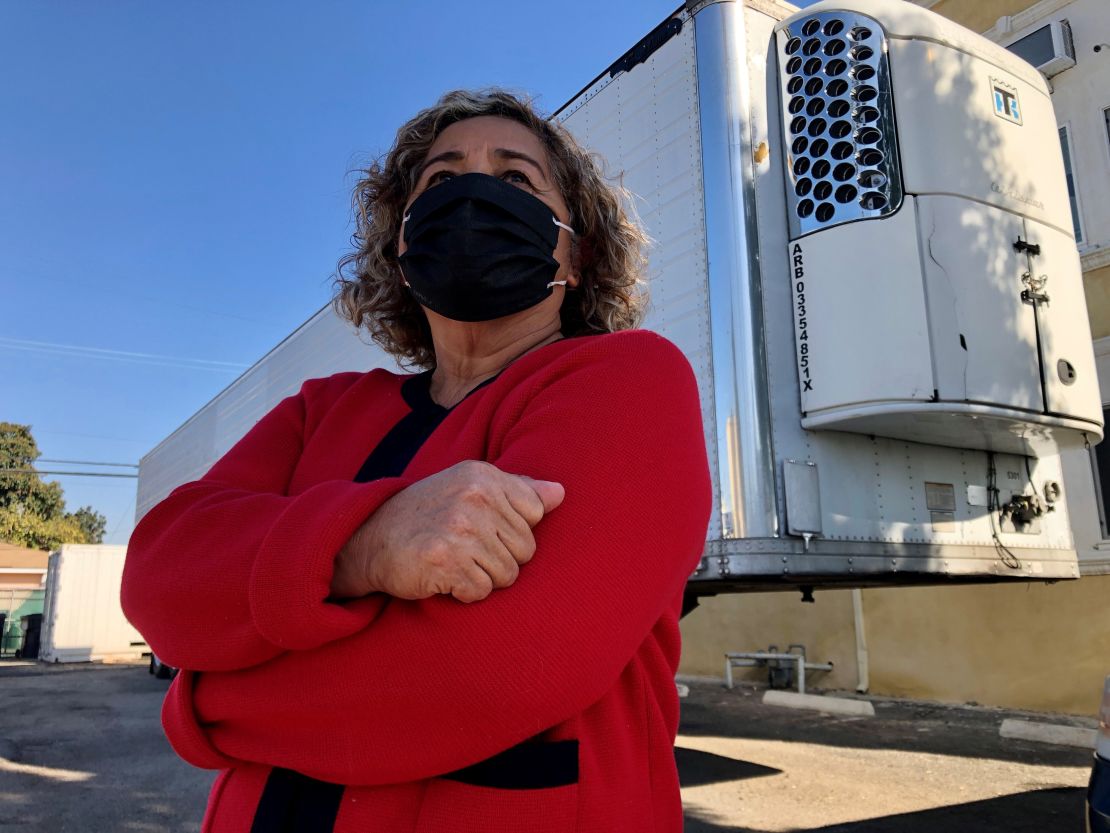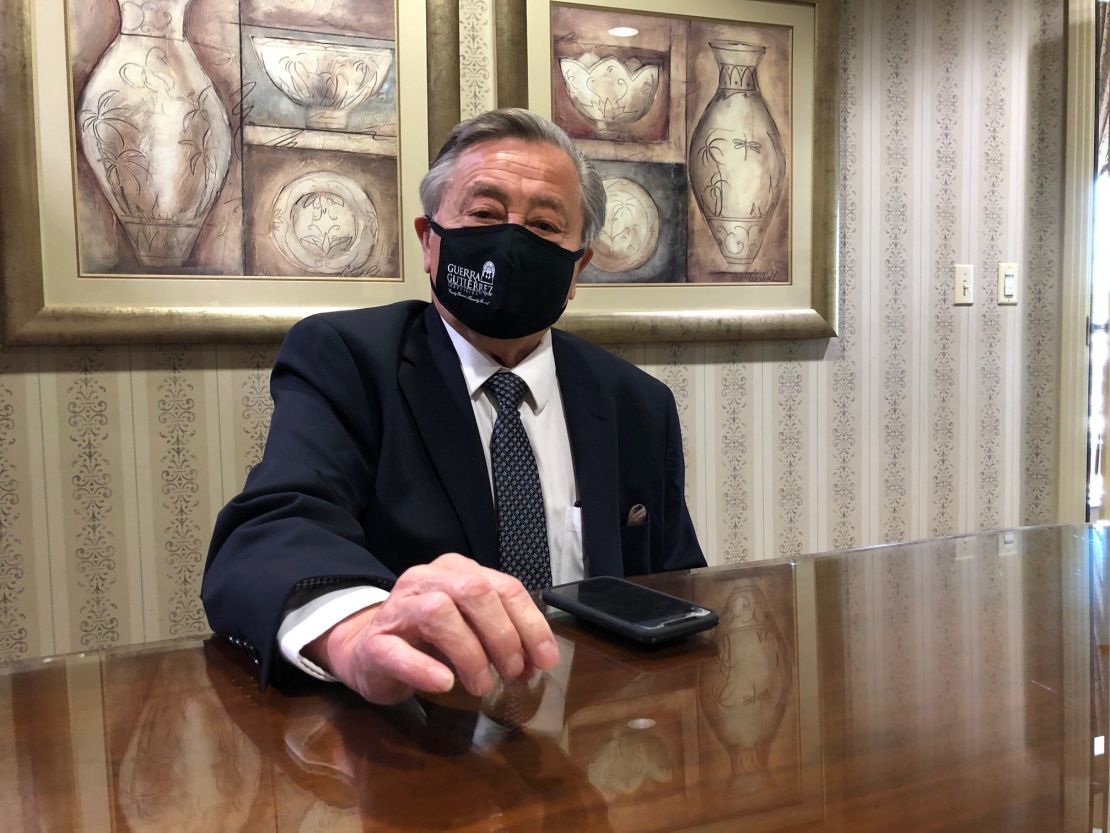The weekly tallies of Covid-19 cases and deaths in the United States have never been higher,and state officials are warning of more alarming patterns following the holiday season.
The total number of Americans infected with the virus surpassed 22 million Saturday, according to Johns Hopkins University data, and more than 372,000 have died.
Kentucky Gov. Andy Beshear said the state was seeing a “real and significant increase in cases and our positivity rate from people’s gatherings around the holiday.”
“This surge that we’re in right now is at least twice the rate, the seriousness, of the previous surges that we have seen,” the governor said Friday. “This is our most dangerous time.”
Colorado’s state epidemiologist, Dr. Rachel Herlihy, on Friday warned of “early signs” of a rise in Covid-19 cases. “We are starting to see the impact of the holidays show up in our data,” she said. Health experts believe about one in 105 residents are currently contagious, Herlihy added.
Health officials are also concerned Wednesday’s storming of the US Capitol may have consequences for the pandemic.
The director of the Centers for Disease Control and Prevention warned Friday that the riot would likely be a “surge event” that will have “public health consequences.”
“You had largely unmasked individuals in a non-distanced fashion, who were all through the Capitol,” Dr. Robert Redfield told the McClatchy newspaper group. “Then these individuals all are going in cars and trains and planes going home all across the country right now.”
“So I do think this is an event that will probably lead to a significant spreading,” he added.
In the nine days since the start of 2021, the US has recorded more than 2 million new Covid-19 cases and more than 26,000 deaths, according to data from Johns Hopkins University.
The nation has averaged about 247,200 Covid-19 cases a day over the last week as of Friday – an all-time high, and more than 3.7 times greater than a summertime peak set in late July, Johns Hopkins data shows.
And the country has averaged 2,982 deaths a day over the last week – the highest figure of the pandemic, according to Johns Hopkins. This week also saw the first time the US reported more than 4,000 coronavirus deaths in a single day, on Thursday.
Hospitalizations, meanwhile, have been pushing some facilities and medical staffs to their limits. Some 130,777 Covid-19 patients were in US hospitals on Saturday– the fifth-highest figure recorded, according to data from the COVID Tracking Project.
Biden team announces plan to ratchet up vaccine rollout
At this point, the country’s only choice is to “vaccinate our way through this,” said Dr. Peter Hotez, dean of tropical medicine at Baylor College.
“We are in a race against death right now,” he told CNN’s Ana Cabrera on Saturday. “And that’s why we have to accelerate our vaccine program.”
President-elect Joe Biden will aim to release nearly all available doses of Covid-19 vaccines in an effort to quickly ramp up the US vaccine rollout.
But it could also be risky, since both vaccines by Pfizer/BioNTech and Moderna require two doses administered weeks apart to be about 95% effective, and vaccine manufacturing has not ramped up as rapidly as many experts had hoped.
The plan is a break from the strategy of the Trump administration, which has held back doses of the vaccines to ensure that second doses are available.
Dr. Celine Gounder, a member of Biden’s coronavirus advisory board, told CNN Saturday the new plan aims to “get doses out as quickly as possible” and simplify distribution.
Officials are not recommending patients delay receiving their second doses, she said. People should still plan to receive the second dose of Pfizer’s vaccine 21 days after the first dose, and the Moderna vaccine 28 days after the first dose.
“So long as there are not any manufacturing glitches, we’re confident that the supply of vaccine will be there when people return for their second dose,” Gounder said.
Asked about the plan, Hotez said he was “all for increasing the number of Americans who get vaccinated.” But he stressed that people need to understand the importance of receiving the second dose.
“I’m just worried people may get the wrong message, saying, ‘Hey, it’s okay to walk around with just a single dose,’” he said, “because that’s not the case.”
Biden’s team is also debating whether vaccine guidance prioritizing certain groups – such as health care workers and residents of long-term living facilities – should be changed, Gounder said.
“Whether we will expand to other groups quicker really remains to be seen,” she said, adding some states have already deviated from the recommendations.
“I think big picture, the goal here is to get as many people vaccinated as quickly as possible and as safely as possible,” she said.
California is struggling
California especially has been struggling with brutal surges in cases and hospitalizations. More than 4,930 patients were in the ICU on Saturday, according to the California Department of Public Health, an all-time high.
And the daily death rates there have been so overwhelming, some California hospitals’ morgues are full, and coroners who’ve been asked to help with storage until funeral workers can get them also are running out of room.
So, the state has sent 88 refrigerated trailers to hospitals and counties to give them the space they need, officials said Friday.
Los Angeles County – the most populous in the nation – has been averaging a Covid-19 death roughly every eight minutes, city Mayor Eric Garcetti said this week. On Friday, county health officials reported the most Covid-19 deaths ever reported there in a single day: 318.
Dr. Anish Mahajan, chief medical officer at the Harbor-UCLA Medical Center, told CNN Saturday that with hospitals already this stretched, he is terrified to think about the kind of surges Christmas gatherings may bring.
“It takes two to three weeks for patients to get sick enough to need the hospital after they’ve gotten the virus, and Christmas was only two weeks ago, and we’re already full,” Mahajan said.
Overwhelmed funeral homes are sharing hearses
In Montebello, just outside Los Angeles, the headquarters of two large funeral home chains paint a picture of weariness and despair.
At Guerra & Gutierrez Mortuaries, owner Richard Gutierrez says his six mortuaries usually would handle about 28 services a day before the pandemic. They now are running about 56 daily – about 70% of them for victims of coronavirus.
At the Continental Funeral Home just a few blocks down Beverly Boulevard, owner Magda Maldonado stood Friday in front of a freezer trailer that she’d recently bought to store dozens of bodies.

She said she feels stress grating her insides. Beyond all the people they’re serving, both she and Gutierrez are having to turn dozens of grieving families away.
And because of the crushing demand and government pandemic-era restrictions on gatherings, they’re not able to provide normal service for the big working class, Hispanic, Catholic families that they tend to serve – with a prayer vigil, a Mass and a wake spread over two days. Montebello is a city whose population is about 77% Hispanic or Latino.
“I am overwhelmed. I am with anxiety disorder now, because of this,” Maldonado said. “My employees are overwhelmed and tired.”
On Friday, clusters of mourners, most of them Latino and dressed in black, were gathered outside both overburdened funeral centers.
Gutierrez said he was grateful to Continental, which is lending him hearses when he runs out.

Pressure to serve so many families well, and sorrow over seeing so many people having been killed prematurely by Covid-19, is leaving him with anxiety, too, he said.
He recalled situations where he’d realize he’d have to arrange funerals for two members of a family, both of whom had died of the virus, such as a husband and wife.
“We’ll say, ‘Well, wait – we have the same last names together. Oh my God,’” he said. “It was just unbearable – and both of them Covid.”
Officials fighting vaccine hesitancy see ‘overwhelming’ demand
Meanwhile, officials across the country continue to administer vaccines and work towards overcoming vaccine hesitancy.
Among them is Dekalb County Health Director Dr. Sandra Elizabeth Ford in Georgia, where officials on Saturday were vaccinating first responders in addition to health care workers.
Vaccines will also be available starting Monday for adults ages 65 and older, Ford told CNN, and demand is “overwhelming.”
“We opened up our site yesterday for the seniors, the 65 and older, and in two hours we had almost 6,000 requests,” Ford said.
Ford recognized some people remain hesitant of receiving a Covid-19 vaccine. But she believed that as more people get it and share their stories, the more people will be willing to get vaccinated.
“What I’m concerned about is that there’s still a population of folks that are super anxious about this vaccine, and most likely that’s the population that needs it the most,” she said, pointing to the African American community, seniors citizens and non-English speakers.
A similar effort was taking place nearby at the Morehouse School of Medicine in Atlanta, which is hosting vaccination drives each Saturday in January.
Dr. Valerie Montgomery Rice, president and dean of the historically Black college’s school of medicine, received her second dose of the vaccine on Friday. And earlier in the week, several high-profile civil rights leaders were vaccinated there, including former UN Ambassador Andrew Young.
“We were doing this so that people have confidence,” Rice told CNN. “I think we have shown that there may have been some hesitancy, but we are clearly, based on the lines you’re seeing, moving to vaccine acceptance.”
CNN’s Natasha Chen, Kevin Conlon, John Bonifield, Stella Chan, Lauren Mascarenhas, Naomi Thomas, Betsy Klein, Sara Murray, Jim Acosta, Maggie Fox, and Michael Nedelman contributed to this report.






